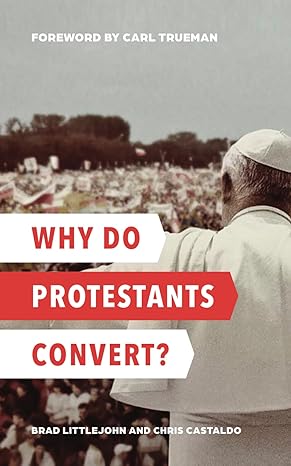Dr. Gavin Ortlund is a Reformed Baptist author, speaker, pastor, scholar, and apologist for the Christian faith. He has a Ph.D. from Fuller Theological Seminary in historical theology, and an M.Div from Covenant Theological Seminary. Gavin is the author of seven books as well as numerous academic and popular articles. For a list of publications, see his CV. He runs the very popular YouTube channel Truth Unites, which seeks to provide an “irenic” voice on theology, apologetics, and the Christian life. See also his website, Truth Unites and his blog.
In my opinion, he is currently the best and most influential popular-level Protestant apologist, who (especially) interacts with and offers thoughtful critiques of Catholic positions, from a refreshing ecumenical (not anti-Catholic), but nevertheless solidly Protestant perspective. That’s what I want to interact with, so I have done many replies to Gavin and will continue to do so. His words will be in blue. I use RSV for all Bible passages unless otherwise specified.
All of my replies to Gavin are collected in one place on my Calvinism & General Protestantism web page, near the top in the section, “Replies to Reformed Baptist Gavin Ortlund.”
This is my 21st reply to his material.
*****
This is a response to Gavin’s video, Why Do Protestants Convert? With Brad Littlejohn and Chris Castaldo (1-22-24), devoted to discussing the book of the same title with its two co-authors. Brad’s words will be in green; Chris’s in purple.
Gavin endorsed the book written by his two guests, writing (in a screenshot in this video at 0:46), “They do not trivialize, oversimplify, or condescend to this phenomenon. On the contrary, they take it with the utmost seriousness and show it must not be dismissed.”
1:31 it’s not condescending; it doesn’t psychoanalyze people, but it gives some plausible reasons and then helps us respond, and a lot of that is going to be on us as Protestants to reform our own practice where we need to according to the Scripture.
I deeply appreciate this approach, as a convert myself (1990). I have replied to many critiques of my own conversion or those of others (see my web page devoted to Catholic converts and conversion). Almost invariably, they were condescending, insulting, blatantly prejudiced, fact-challenged, unserious, etc., whereas I have written articles like, “Gratefulness for My Evangelical Protestant Background” [3-18-08] and “My Respect for Protestants / Catholic Ecumenical Principles” [2001; addendum: 1-8-03].
What was attacked the most, if memory serves, were the motives of converts like myself. I would say that the vast majority of those sorts of supposedly “mind-reading” attacks come from anti-Catholics: folks who don’t consider Catholics Christians at all. Therefore, for Protestants to become Catholics is the same to these folks as apostasy: leaving the faith altogether. And of course they can’t look favorably on that, and so anything goes when they analyze someone who made that change. We must be the scum of the earth.
Gavin is not an anti-Catholic, and it appears that his two guests are not, either (they’re all scholars), and they lack the ubiquitous hostility, inevitably leading to irrationality and unfruitful discussion. It becomes a conversation between brothers and sisters in Christ (and if Gavin responds to this, it will continue in the same manner. I’m delighted to have the opportunity to join that sort of discussion. Praise God that it exists. It’s been a long time coming online . . .
1:08 there’s a trend toward that right now [Protestants converting to Catholicism or Orthodoxy]. This is a phenomenon that needs to be interpreted . . .
It’s fascinating to see such a statement from a Protestant, and it will be intensely interesting to me to see how they talk about the causes for this. From where I sit, I would say (predictably) that there is movement because we believe that we have the fullness of Christian truth. It’s not going from evil to good (the anti-Protestant mentality) or from light to darkness (the anti-Catholic mentality), but to what one feels is a fuller, more complete and history-based version of Christianity, without necessarily decrying what one has already learned and gained in Protestantism. Likewise, former Catholic Protestants say that they found things that they believed to be absent in Catholicism and that they chose the path that they felt had relatively more Christian truth in it.
I (like very many Catholic converts) saw my conversion as going from “very good” to “best.” I sincerely thank God every day for what I learned in evangelical Protestant circles. It was almost all very good. I have a deep respect and affection for my Protestant brothers and sisters. I simply discovered that there was more to Christianity, and I wanted that. I wanted all I could get. I viewed it as part of loving God with all of my heart, soul, strength, and mind. Both sides agree that we all have to follow our own consciences and best lights. We need to assume that “the other guy” is doing that, too.
3:47 I’ve just found that a lot of Protestants assume Protestantism and don’t necessarily have good reflection about why they are a Protestant.
This is the overwhelming tendency on both sides (though I would say that Catholics, sadly, tend to be far more ignorant in this regard than Protestants), and many depart one belief-system for another as a result of rejecting straw men or not being aware of the resources and thought available, whereby they may have reconsidered conversion. To put it more bluntly, ignorance is at a premium among Christians as a whole, and the apologist for Christianity in general or for a particular Christian belief-system, provide reasons for why we believe what we believe. That’s where there is a need for adequate education all-around, and apologists can offer some input and help.
10:20 one of the things I appreciated about your book is, you guys aren’t sort of psychoanalyzing people at an individual level, where you’re saying, “we know someone’s motives.” We don’t know people’s motives. We can’t read someone’s heart at an individual level. We’re going to leave those judgments to God. . . . you hear these silly things too of like, “oh they’re doing it for the money . . .”
Amen and bravo! I make a great effort in my apologetics to try to never do that. If I disagree with someone, I’ll give the theological, historical, apologetic reasons why I do, with all due respect, and minus a sense of “you’re a moron because you believe so-and-so” or “you’re being deliberately dishonest,” etc. I sometimes can be very passionate, but it’s never personal; it’s not seeking to attack persons and motives; only their beliefs that I have honest disagreements with.
One person (a famous Protestant apologist who shall remain unnamed), was at first absolutely convinced that I converted out of stupefying ignorance of Protestant theology. I was dumber than a doornail, and dumb people do a lot of dumb things. Then I produced a list of Protestant books that I had read (most of which were or still are in my own personal library). Without missing a beat, he then stated that my case was one of “knowing deception.” If I wasn’t ignorant, than I just had to be an evil person and a deceiver. There couldn’t possibly be a praiseworthy or spiritual or truly Christian motive or reasoning: not when a Protestant goes Catholic. I can’t describe how refreshing it is to se an analysis that is not typified by that sort of disdainful slop. We can agree on a lot of non-theological things in this discussion.
14:18 we’re all interested in . . . explaining Protestant beliefs, defending Protestant beliefs, trying to remove caricatures from Protestant beliefs that are very common . . .
And I do the same on my end as a catholic apologist. Defeating misinformation and miscomprehensions or distortions is a net gain for everyone. My goal is not only to explain and defend authentic Catholicism, but also to explain authentic Protestantism, and to oppose distortions and falsehoods about it, which do not help Catholics make their case. We must all do our best to be absolutely honest and accurate. There is an old adage in middle school debate teams, that one must know the view of one’s opponent even better than they know it themselves.
14:30 in your discussion of the theology of conversions you discuss the quest for certainty . . . I do suspect that this is commonly out there and I do see this a lot especially right now in our world, where there’s so much uncertainty and anxiety. I sometimes think people are looking to a church tradition to meet this particular need in the heart for certainty.
This is a common “psychological / epistemological” sort of analysis often made of the Catholic convert. I think it is more correct to say that many of us simply thought that we were searching for more Christian truth and found it: a bit like the pearl of great price in the Bible. The Catholic contends that in the NT (especially Paul’s letters) “truth” is greatly emphasized. The phrase “the truth” appears in the NT 70 times. I have collected 295 Bible passages about notions like “the faith” and “the truth” and “the doctrine” and “teaching” and “the message”: all essentially synonymous.
We object to Protestantism relegating whole areas of theology (notably, baptism and the Eucharist or Lord’s Supper) and ecclesiology to the individual’s arbitrary choice, as if views that contradict each other are fine and dandy, leading inevitably to a sort of doctrinal relativism and institutional chaos, which is reflected in ever-proliferating Protestant denominations. This appears to us to run counter to what one might call “the spirit of certainty and truth” that seems to be presupposed in the NT. And perhaps this is what many Catholic converts sense and no longer agree with. The “quest for certainty” analysis of Catholic converts continues, but I submit that the table can be turned, and objections made to “the quest for uncertainty” or the “non-quest for certainty” that prevails in Protestantism as a whole. I have written about it several times:
The Protestant “Non-Quest” for Certainty [3-15-06; abridged and links added on 7-12-20]
Glorying in Uncertainty in Modern Protestantism (Dialogue with a Calvinist) [11-11-09]
Radically Unbiblical Protestant “Quest for Uncertainty” [2-12-14]
Gavin seems to agree with my pint to some extent when he states at 15:09: “I really do believe the Holy Spirit has a ministry of assurance to the human heart through faith in Christ, and He communicates a powerful sense of assurance to our heart . . .” He may be talking only about assurance of salvation; maybe not. But we would apply this to all Christian doctrines, according to Jesus’ teaching that the Holy Spirit “will teach you all things” (Jn 14:26) and “guide you into all the truth” (Jn 16:13). St. Paul referred to “words not taught by human wisdom but taught by the Spirit, interpreting spiritual truths to those who possess the Spirit” (1 Cor 2:13) and he also wrote: “guard the truth that has been entrusted to you by the Holy Spirit who dwells within us” (2 Tim 1:14).
16:50 you know I follow [Fr.] James Martin on Twitter X, whose feed is clad in rainbows, and I also follow Robbie George who is a champion for conservative conviction. Both of them insist on the magisterium who is right. In other words, it seems like there the magisterium itself needs to be interpreted and there you will have different understandings, different conclusions among Catholics.
This is easily answered. Everyone pretty much knows (i.e., both those who agree and disagree with it) that the Catholic Church teaches that homosexual sexual acts are “intrinsically disordered” and “contrary to the natural law.” Here is what the Catechism states:
2357 Homosexuality refers to relations between men or between women who experience an exclusive or predominant sexual attraction toward persons of the same sex. It has taken a great variety of forms through the centuries and in different cultures. Its psychological genesis remains largely unexplained. Basing itself on Sacred Scripture, which presents homosexual acts as acts of grave depravity, tradition has always declared that “homosexual acts are intrinsically disordered.” They are contrary to the natural law. They close the sexual act to the gift of life. They do not proceed from a genuine affective and sexual complementarity. Under no circumstances can they be approved.
2358 The number of men and women who have deep-seated homosexual tendencies is not negligible. This inclination, which is objectively disordered, constitutes for most of them a trial. They must be accepted with respect, compassion, and sensitivity. Every sign of unjust discrimination in their regard should be avoided. These persons are called to fulfill God’s will in their lives and, if they are Christians, to unite to the sacrifice of the Lord’s Cross the difficulties they may encounter from their condition.
2359 Homosexual persons are called to chastity. By the virtues of self-mastery that teach them inner freedom, at times by the support of disinterested friendship, by prayer and sacramental grace, they can and should gradually and resolutely approach Christian perfection.
There is no dispute whatsoever about this. Fr. James Martin, like all theological liberals, simply wants to change Church teaching on it, but there is no sign whatsoever of that happening. To observe those sorts of compromising changes (and sanction of serious sin), we must look at hundreds of Protestant denominations who now see nothing wrong whatsoever with same-sex so-called “marriage”. Fr. Martin wants to change the Catholic view of marriage because he doesn’t agree with it. He picks and chooses what he will believe in Catholic teaching. And he questions the Bible itself. Hence he wrote on 23 October 2019 on his Twitter page: “Where the Bible mentions [same-sex sexual] behavior at all, it clearly condemns it. I freely grant that. The issue is precisely whether the biblical judgment is correct.”
This is the very quintessence of theological liberalism (with whom both Protestants and Catholics are “blessed”). They start by attacking the Bible. Then they will attack the Christian traditions that they claim to be part of. The problem, in other words, is not with the Catholic magisterium, which is quite clear and unequivocal on this issue. The problem is with the flawed methodologies of religiously dissident, heterodox theological liberals. Let’s place the blame where it squarely lies.
This is a variation of another common argument against Catholic authority, which has been called “the infallibility regress.” It, too, fails, as I think I demonstrate in several papers (the above example is a classic case of it failing):
Church Authority & Certainty (The “Infallibility Regress”) [July 2000; some revisions on 12-8-11]
Ecclesiological Certainty (?) & the “Infallibility Regress” [5-22-03 and 10-7-08]
Does Church Infallibility Require Infallible Catholics? [6-8-10]
“How Can we Find a List of Infallible Catholic Doctrines?” [12-15-18]
22:55 any spectrum of opinions that you can find within Protestantism, you can basically find the same spectrum of opinions within Roman Catholicism.
See my papers:
45:43 I cannot name a single — not one — Church Father who said there are seven sacraments; not a single one you can find. Some will say there are more than two or use the word sacrament more broadly, but never seven to my awareness. And I’ve not found anybody who’s pushed
***
*
Practical Matters: Perhaps some of my 4,500+ free online articles (the most comprehensive “one-stop” Catholic apologetics site) or fifty-five books have helped you (by God’s grace) to decide to become Catholic or to return to the Church, or better understand some doctrines and why we believe them.
Or you may believe my work is worthy to support for the purpose of apologetics and evangelism in general. If so, please seriously consider a much-needed financial contribution. I’m always in need of more funds: especially monthly support. “The laborer is worthy of his wages” (1 Tim 5:18, NKJV). 1 December 2021 was my 20th anniversary as a full-time Catholic apologist, and February 2022 marked the 25th anniversary of my blog.
PayPal donations are the easiest: just send to my email address: [email protected]. Here’s also a second page to get to PayPal. You’ll see the term “Catholic Used Book Service”, which is my old side-business. To learn about the different methods of contributing (including Zelle), see my page: About Catholic Apologist Dave Armstrong / Donation Information. Thanks a million from the bottom of my heart!
*
***
Photo credit: cover of the book, Why Do Protestants Convert?, by Brad Littlejohn and Chris Castaldo, from its Amazon book page.
Summary: I discuss with Gavin Ortlund & two others several aspects of the process of conversion from Protestant to Catholic, agreeing in some ways & disagreeing in others.














